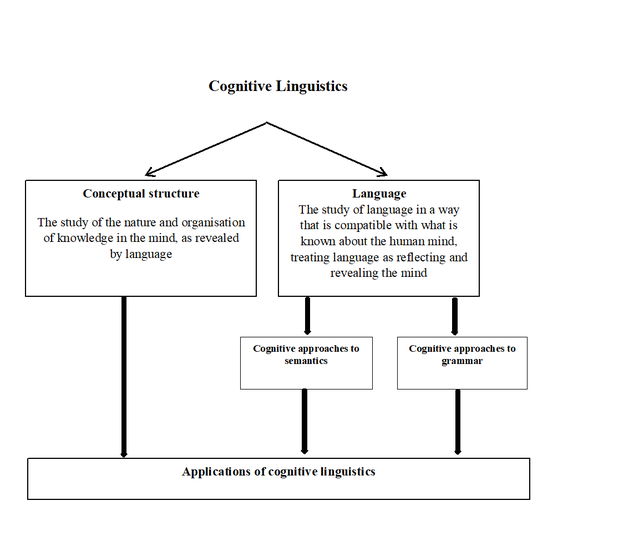Cognition
What Is Cognitive Linguistics?
A new paradigm in the study of language and the mind.
Posted July 12, 2019 Reviewed by Ekua Hagan
Cognitive linguistics is a modern school of linguistic thought that originally began to emerge in the 1970s due to dissatisfaction with formal approaches to language. As I explain in my book, Cognitive Linguistics: A Complete Guide, it is also firmly rooted in the emergence of modern cognitive science in the 1960s and 1970s, particularly in work relating to human categorization, and in earlier traditions such as Gestalt psychology.
Early research was spearheaded during the second half of the 1970s by the so-called "founding fathers" of cognitive linguistics: Ronald Langacker, George Lakoff and Leonard Talmy.
Langacker, during this period, began work on his theory of Cognitive Grammar, then dubbed "space grammar." Lakoff was working on a related approach to grammar that came to be dubbed Construction Grammar, as well as a semantic basis for grammar, termed "linguistic gestalts." This notion later evolved into his theory of conceptual metaphor theory, developed with philosopher Mark Johnson.
During the 1980s, Lakoff, influenced by his colleagues Charles Fillmore and Eleanor Rosch at University California, Berkeley, began applying new approaches to categorization, in particular, Prototype Theory to modeling linguistic representation in the minds of language users. This gave rise, among other things, to a new "cognitive" approach to semantics, especially lexical semantics. Meanwhile, Talmy was engaged in developing a theory which he termed Cognitive Semantics.
By the mid to late 1980s these approaches, together with research from other leading researchers, most notably French-American researcher Gilles Fauconnier, had coalesced into a broad research program that adopted a broad empiricist and non-modular approach to language and mind, that came to be called "cognitive linguistics;" in essence, the various theories shared a common impulse to model language and human communication in ways that were cognitively realistic, rather than adopting the modular, computational view of mind inherited from early research in cognitive science.
And by the early 1990s, there was a growing proliferation of research in this area, and of researchers who identified themselves as "cognitive linguists." In 1989/90, the International Cognitive Linguistics Society was established, together with the journal Cognitive Linguistics. In the words of the eminent cognitive linguist Ronald Langacker this "marked the birth of cognitive linguistics as a broadly grounded, self-conscious intellectual movement."
The Cognitive Linguistics Enterprise
Cognitive linguistics is described as a "movement" or an "enterprise" because it is not a specific theory. Rather, it is an approach that has adopted a common set of guiding principles, assumptions and perspectives which have led to a diverse range of complementary, overlapping (and sometimes competing) theories.
The cognitive linguistics enterprise is characterized by two key commitments. These are:
- The Generalisation Commitment: A commitment to the characterization of general principles that are responsible for all aspects of human language.
- The Cognitive Commitment: A commitment to providing a characterization of general principles for language that accords with what is known about the mind and brain from other disciplines. As these commitments are what imbue cognitive linguistics with its distinctive character, and differentiate it from formal linguistics.
The Generalisation Commitment
Cognitive linguists make the assumption that there are common structuring principles that hold across different aspects of language; moreover, they further assume that an important function of language science is to identify these common principles.
In modern linguistics, the study of language is often separated into distinct areas such as phonetics (sound production and reception), phonology (sound patterns), semantics (word and sentence meaning), pragmatics (meaning in discourse context), morphology (word structure) syntax (sentence structure) and so on.
This is particularly true of formal linguistics: a set of approaches to modeling language that posit explicit mechanical devices or procedures operating on theoretical primitives in order to produce the complete set of linguistic possibilities in a given language.
Within formal linguistics (such as the Generative Grammar approach developed by Noam Chomsky), it is usually argued that areas such as phonology, semantics and syntax concern significantly different kinds of structuring principles operating over different kinds of primitives.
For instance, a syntax module is an area—a neurological system—in the mind/brain specialized for structuring words into sentences. In contrast, a phonology component of the mind would be concerned with structuring sounds into patterns permitted by the rules of any given language, and by human language in general.
This modular view of mind reinforces the idea that modern linguistics is justified in separating the study of language into distinct sub-disciplines, not only on grounds of practicality but because the components of language are wholly distinct and, in terms of organization, incommensurable. This is a view I critiqued in my earlier book, The Language Myth.
Cognitive linguists typically acknowledge that it may often be useful, for practical purposes, to treat areas such as syntax, semantics, and phonology as being notionally distinct. The study of syntactic organisation involves, at least in part, the study of slightly different kinds of cognitive and linguistic phenomena than the study of phonological organisation.
However, given the Generalisation Commitment, cognitive linguists disagree that the modules or subsystems of language are organised in significantly divergent ways, or indeed that distinct modules or subsystems even exist in the mind/brain.
The Cognitive Commitment
The Generalisation Commitment leads to the search for principles of language structure that hold across all aspects of language. In a related fashion, the Cognitive Commitment represents the view that principles of linguistic structure should reflect what is known about human cognition from other disciplines, particularly the other cognitive sciences (philosophy, psychology, artificial intelligence and neuroscience).
Hence, it follows from the Cognitive Commitment that language and linguistic organisation should reflect general cognitive principles rather than cognitive principles that are specific to language.
Accordingly, cognitive linguistics rejects the modular theory of mind that I mentioned above. The modularity of mind is associated particularly with formal linguistics, but is also explored in other areas of cognitive science such as philosophy and cognitive psychology, and holds that the human mind is organised into distinct "encapsulated" modules of knowledge.
While there are different versions of the modularity thesis, in general terms, modules are claimed to "digest" raw sensory input in such a way that it can then be processed by the central cognitive system (involving deduction, reasoning, memory and so on). Cognitive linguists specifically reject the claim that there is a distinct language module, which asserts that linguistic structure and organisation are markedly distinct from other aspects of cognition.
The Field of Cognitive Linguistics
Cognitive linguistics has its roots in theoretical linguistics. Today, cognitive linguists no longer restrict themselves to the narrow remit of theory construction: ideas, theories, and methods from cognitive linguistics are increasingly applied to a wide array of aesthetic, communicative, developmental, educational and cultural phenomena across a wide array of disciplinary contexts including the behavioural, biological, cognitive and social sciences as well as the humanities. This is a testament to the broad appeal and applicability of the range of ideas and theoretical frameworks that have emerged within the cognitive linguistics enterprise.
Cognitive linguistics has two main foci. The first constitutes a focus on the way in which knowledge representation—conceptual structure—is organised in the mind. Given the core commitments of the enterprise, cognitive linguists hold that language reflects cognitive organisation. Consequently, cognitive linguists deploy language in order to investigate conceptual structure.
A clear example of this is the conceptual metaphor theory. Conceptual metaphors are claimed to be units of knowledge representation, in the mind, rather than being linguistic in nature. Yet, as language reflects conceptual organisation, their existence is revealed by patterns in language: patterns in language reveal patterns in the mind, an issue I address in my book: The Crucible of Language.
Of course, as language provides a somewhat partial window on the mind, cognitive linguists invoke the notion of converging evidence. Behavioural studies from experimental psychology have been deployed in order to provide converging evidence for the psychological reality of conceptual metaphors, for instance. The upshot is that cognitive linguistic theories, that have deployed language as the lens through which cognitive phenomena can be investigated amount to models of the mind.
The second constitutes a focus on language: After all, cognitive linguists, like other linguists, study language for its own sake. But again, a consequence of the commitments of the enterprise, language is held to reflect general aspects of cognition. And as such, language can't be artificially separated from the conceptual phenomena that it in large part reflects and is shaped by. One concrete manifestation of this is that language is held to reflect more general, organisational properties of cognition, such as embodiment and the nature of categorisation.
Another is that aspects of language that are treated as discrete and encapsulated in formal linguistics, such as grammar, cannot be treated as such within cognitive linguistics; cognitive linguists take a broadly functional perspective: language emerged to facilitate communicative meaning. Hence, grammatical organisation, which supports situated meaning, cannot be artificially separated from the study of meaning, which it is specialised to facilitate.
Within cognitive linguistics, the study of language often exhibits either a focus on semantics, or on grammar, although there is typically no hard and fast division between the way the two are studied, despite the specific focus adopted. In practice, the division arises due to the focus of a particular researcher, or of the research question being investigated, rather than due to a principled division.
The area of study involving cognitive linguistics approaches to semantics is concerned with investigating a number of semantic phenomena. One such phenomenon is linguistic semantics, encompassing phenomena traditionally studied under the aegis of lexical semantics (word meaning), compositional semantics (sentence meaning), and pragmatics (situated meaning). It also encompasses phenomena not addressed under these traditional headings, such as the relationship between experience, the conceptual system and the semantic structure encoded by language during the process of meaning construction.
Cognitive linguistics approaches to grammar take the view that a model of meaning (a "cognitive semantics" account), has to be delineated before an adequate cognitive model of grammar can be developed. This is because grammar is viewed within the cognitive linguistics enterprise as a meaningful system in and of itself, which therefore shares important properties with the system of linguistic meaning and cannot be functionally separated from it.
Cognitive grammarians have also typically adopted one of two foci. Scholars including Ronald Langacker have emphasised the study of the cognitive principles that give rise to linguistic organisation. In his theoretical framework, Cognitive Grammar, Langacker has attempted to delineate the principles that serve to structure a grammar, and to relate these to aspects of general cognition.
The second avenue of investigation, pursued by researchers aims to provide a more descriptively detailed account of the units that comprise a particular language. These researchers have attempted to provide an inventory of the units of language. Cognitive grammarians who have pursued this line of investigation are developing a set of theories that can collectively be called construction grammars, or sometimes constructionist models. This approach takes its name from the view in cognitive linguistics that the basic unit of language is a form-meaning symbolic assembly which is called a construction.
It follows that cognitive approaches to grammar are not restricted to investigating aspects of the grammatical structure largely independently of meaning, as is often the case in formal traditions. Instead, cognitive approaches to grammar encompass the entire inventory of linguistic units defined as form-meaning pairings.
These run the gamut from skeletal syntactic configurations such as the ditransitive construction, e.g., The window cleaner blew the supermodel a kiss, to idioms, He bent over backward, to bound morphemes such as the -er suffix, to words. This entails that the received view of clearly distinct "sub-modules" of language cannot be meaningfully upheld within cognitive linguistics, where the boundary between cognitive approaches to semantics and cognitive approaches to grammar is less clearly defined.
Instead, meaning and grammar are seen as two sides of the same coin: to take a cognitive approach to grammar is to study the units of language and hence the language system itself. To take a cognitive approach to semantics is to attempt to understand how this linguistic system relates to the conceptual system, which in turn relates to embodied experience. The concerns of cognitive approaches to semantics and cognitive approaches to grammar are thus complementary.
The following diagram provides a schematic representation of the main theoretical foci of cognitive linguistics.

References
Evans, Vyvyan. 2019. Cognitive Linguistics: A Complete Guide. Edinburgh University Press.
Evans, Vyvyan. 2015. The Crucible of Language: How Language and Mind Create Meaning. Cambridge University Press.
Evans, Vyvyan. 2014. The Language Myth: Why Language is not an Instinct. Cambridge University Press.




